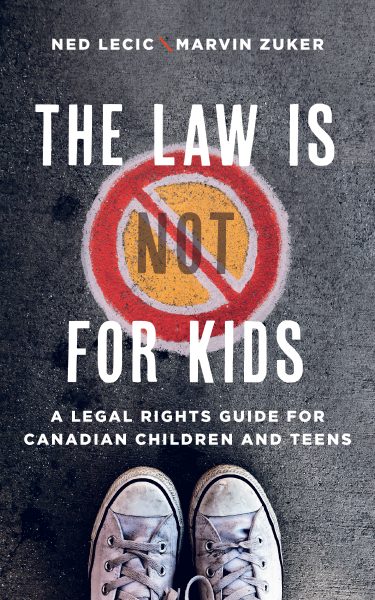The Law Is (Not) for Kids, Second Edition A Legal Rights Guide for Canadian Children and Teens
Ned Lecic and Marvin A. Zuker

Subjects: Cultural Studies, Law
Imprint: AU Press
Revised and updated edition now available!
In this practical guide to the law for young people of Canada, Ned Lecic and Marvin Zuker provide an all-encompassing manual meant to empower and educate children and youth and those that serve them. The authors address questions about how rights and laws affect the lives of young people at home, at school, at work, and in their relationships as they draw attention to the many ways in which a person’s life can intersect with the law. Deliberately refraining from taking a moral approach, the authors instead advocate for the rights of children and provide examples of how young people can get their legal rights enforced. In addition to being critical information for youth about citizenship, The Law is (Not) for Kids is a valuable resource for teachers, counsellors, lawyers, and all those who support youth in their encounters with the law.
Lecic and Zuker have done a masterful job in producing this invaluable resource for young people in Canada. The authors answer key questions young people have about rights and laws that affect them at home, at school, at work, and in their relationships. Provincial and territorial variations in law are included making the guide relevant to all Canadian children and youth. The discussion is clear and straightforward with no moralistic or patronizing overtones. The information it contains provides an excellent basis for adults and youth to negotiate rules and standards of behavior.
In addition to being a useful resource to parents and teachers, I would like to see The Law is (Not) for Kids become a required component of citizenship education for all junior and high school students in Canada.”
Katherine Covell, PhD, Children’s Rights Consultant
This is an impressive and valuable book on the legal rights and responsibilities of children and youth in Canada. It describes not only what rights children currently have in Canada in fields such as parent-child relations, employment, sex, marriage, and youth justice, but also what rights they should have, using as a guide the UN Convention on the Rights of the Child. It is a highly welcome book, informative, engaging, and written in language accessible for youth.
R. Brian Howe, Professor Emeritus, Political Science and Children's Rights, Cape Breton University
This book is an important and timely document. The Law is (Not) for Kids is a highly accessible legal manual for young people that apprises them not only of the form and content of Canada’s laws for the young but also what children and youth can expect in terms of their civil liberties, their legal protections, and their ability to influence law and justice. Importantly, while the book speaks directly to young people, it also speaks to a larger public including parents, educators and all levels of judicial officials. A young person’s legal rights document of such clarity and focus has been needed for years and it has finally arrived.
Bernard Schissel, Professor Emeritus, Royal Roads University and Professor Emeritus, University of Saskatchewan
There is a gap in information about these topics for youth, rather than for adults about youth. […] This book should be made widely available and incorporated into school curriculum.
Voula Marinos, Brock University
With this book, Zuker and Lecic offer a friendly and positive starting point for young Canadians to learn about their legal rights and how to advocate for themselves. It is this latter point that makes the book unique; it is not just a book for children on how a bill becomes a law. Rather, the authors believe that children are unfairly treated and do not possess adequate rights within Canada’s legal system, and the information in this book is meant to inform the reader to take action. As such, this book is an invaluable resource to which all young people should have ready access, and it should be included in elementary and secondary school libraries, public libraries, and any other library used by adults who work with children.
Canadian Law Library Review
The Law Is (Not) for Kids will serve as an excellent resource in the classroom, particularly for high school students passionate about legal activism and anyone interested in a future in law.
Canadian Children’s Book News
The Law Is (Not) for Kids deserves a place in any high school library’s circulating collection and its reference shelves.”
CM: Canadian Review of Materials
An invaluable resource not only for parents, counsellors, and educators but also for lawyers, judges, and others who support youth involved in the Canadian legal system. Legislation, conventions, charters, and court cases, along with useful resources, make this book impressive.”
The Lawyer’s Daily
Written for youth and children, this practical guide to the legal rights of minors aims to be “a trustworthy source of information” on everything from children’s rights if parents divorce, to what to do if you (a minor) feel treated unfairly at school, work or elsewhere, to what can happen and what to do if you’re arrested. Clearly written, with fascinating sidebar stories, this is an essential book for young citizens.”
Alberta Views
The Law is (Not) for Kids emphasizes, now more than ever, children and youth should become familiar with their rights and develop tools and resources to support these rights. Lecic and Zuker demonstrate that children and youth should be invited to the table and included in conversations about their wellbeing and rights. This book is a key source in preparing young people for this endeavour and encouraging more young people to share their perspectives with adults who understand the importance of youth inclusion and listening.”
Canadian Criminal Justice Association
This work is licensed under a Creative Commons License (CC BY-NC-ND 4.0). It may be reproduced for non-commercial purposes, provided that the original author is credited.